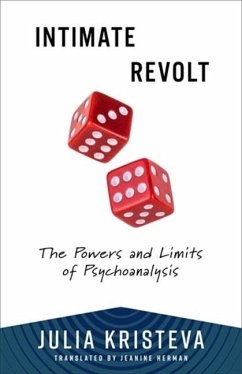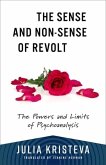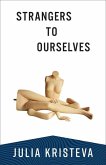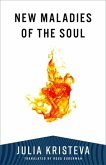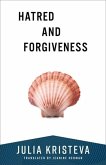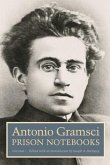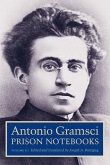21,99 €
inkl. MwSt.
Versandfertig in über 4 Wochen

11 °P sammeln
- Broschiertes Buch
- Merkliste
- Auf die Merkliste
- Bewerten Bewerten
- Teilen
- Produkt teilen
- Produkterinnerung
- Produkterinnerung
A thorough examination of the manner in which three of the most unsettling modern writersâ Aragon, Sartre, and Barthesâ affirm their personal rebellion followed by Kristeva's own ideas on the future of rebellion.
Andere Kunden interessierten sich auch für
![The Sense and Non-Sense of Revolt The Sense and Non-Sense of Revolt]() Julia KristevaThe Sense and Non-Sense of Revolt19,99 €
Julia KristevaThe Sense and Non-Sense of Revolt19,99 €![This Incredible Need to Believe This Incredible Need to Believe]() Julia KristevaThis Incredible Need to Believe12,99 €
Julia KristevaThis Incredible Need to Believe12,99 €![Strangers to Ourselves Strangers to Ourselves]() Julia KristevaStrangers to Ourselves21,99 €
Julia KristevaStrangers to Ourselves21,99 €![New Maladies of the Soul New Maladies of the Soul]() Julia KristevaNew Maladies of the Soul18,99 €
Julia KristevaNew Maladies of the Soul18,99 €![Hatred and Forgiveness Hatred and Forgiveness]() Julia KristevaHatred and Forgiveness18,99 €
Julia KristevaHatred and Forgiveness18,99 €![Prison Notebooks Prison Notebooks]() Antonio GramsciPrison Notebooks41,99 €
Antonio GramsciPrison Notebooks41,99 €![Prison Notebooks Prison Notebooks]() Antonio GramsciPrison Notebooks41,99 €
Antonio GramsciPrison Notebooks41,99 €-
-
-
A thorough examination of the manner in which three of the most unsettling modern writersâ Aragon, Sartre, and Barthesâ affirm their personal rebellion followed by Kristeva's own ideas on the future of rebellion.
Hinweis: Dieser Artikel kann nur an eine deutsche Lieferadresse ausgeliefert werden.
Hinweis: Dieser Artikel kann nur an eine deutsche Lieferadresse ausgeliefert werden.
Produktdetails
- Produktdetails
- European Perspectives: A Series in Social Thought and Cultural Criticism
- Verlag: Columbia University Press
- Seitenzahl: 344
- Erscheinungstermin: 14. Januar 2025
- Englisch
- Abmessung: 137mm x 215mm x 24mm
- Gewicht: 446g
- ISBN-13: 9780231216777
- ISBN-10: 0231216777
- Artikelnr.: 70142164
- Herstellerkennzeichnung
- Libri GmbH
- Europaallee 1
- 36244 Bad Hersfeld
- gpsr@libri.de
- European Perspectives: A Series in Social Thought and Cultural Criticism
- Verlag: Columbia University Press
- Seitenzahl: 344
- Erscheinungstermin: 14. Januar 2025
- Englisch
- Abmessung: 137mm x 215mm x 24mm
- Gewicht: 446g
- ISBN-13: 9780231216777
- ISBN-10: 0231216777
- Artikelnr.: 70142164
- Herstellerkennzeichnung
- Libri GmbH
- Europaallee 1
- 36244 Bad Hersfeld
- gpsr@libri.de
Julia Kristeva is professor emerita of linguistics at the Université de Paris VII. A renowned psychoanalyst, philosopher, and linguist, she has written dozens of books spanning semiotics, political theory, literary criticism, gender and sex, and cultural critique, as well as several novels and autobiographical works, published in English translation by Columbia University Press. Kristeva was the inaugural recipient of the Holberg International Memorial Prize in 2004 "for innovative explorations of questions on the intersection of language, culture, and literature."
Chapter 1. What Revolt Today?
The Dignity of Revolt (The Novel)
Man in Revolt (Retrospective Return)
Revolt as Jouissance and Dispersion (Psychoanalysis)
Negativity in Revolt (Philosophy and...Freud)
Paradoxical Logics (Resistances to Psychoanalysis)
Intimacy in Revolt (The Imaginary)
Chapter 2. Can Forgiveness Heal?
The Trilogy of Evil
Donation or Sadness
The Consciousness of Fault (Heidegger and Freud)
Against Guilt: Rebirth
The Poiesis of Interpretation
Depression at the Edge of Words (the Story of Anne)
Chapter 3. The Scandal of the Timeless
Psychoanalysis is not Intersubjectivity
The Subversion of Temporality
The Freudian Scandal
Three Figures of the Analytical Timeless: 1. The Memory-Trace
(Erinnerungsspur or Errinnerungrest), Working-through (Durcharbeitung), The
Dissolution of Transference-Homo natura and Homo analyticus
Chapter 4. The Intimate: from Sense to the Sensible (Logics, Jouissance,
Style)
Once more, On the Soul (organic, animal, general)
Images, loquela, Jouissance (Augustine, Loyola, Sade)
Psychical Life as Jouissance
Science and Experience: Counter-transference
The Taste for the Singular Life (Style)
Plato's Cave Hides a Sensory Cave
The "Second Dwelling" (Proust's Dream)
Writing, Therapy, Beauty
Between word-signs and word fetishes: Interpretation
Chapter 5. Fantasy and Cinema
Organisms of Mixed Race (Didier, the Collages Man)
Fear and Spectacular Seduction
Fantasy and the Imaginary: The Specular
The Representable Conflict
Cinema and Evil
Chapter 6. Barthes: The Savor of Disenchantment
Iconoclasm
A Position: Writing Against
Modern Man in all his States: Vices and Affections
Myth: A Type of Speech Chosen by History
Chapter 7. Barthes: Constructor of Language, Constructor of the Sensory
The Spiritual Exercises of Loyola
Who is the Subject of this Polyphony?
Images
The loquela
Indifference and Suspension
Chapter 8. Barthes: The Intractable Lover
Figures
The Jardin du Luxembourg
Abysses
Outside Language
Sensory vs. Sexual: The New Lovers
N. W. P.: The Non-will-to-possess
Chapter 9. Sartre: The Imaginary and Nothingness
The Fatal Freedom of Consciousness
Negativity, "I," "Bad Faith"
What Transcendence?
Who is of Bad Faith? or, Atheism
The Realized Imaginary: The Totalizing Spectacle
Chapter 10. Sartre: Freedom as Questioning
Negation at its Origin
Symbolic Castration: A Question (The Story of Martine)
Before Judgment: Repulsion or Freedom?
The Freudian Attempt to Articulate the Drive and the Symbol
Childhood: Self-Destruction or the Power of Words: The Words
Chapter 11. Sartre: Again, the Imaginary, Fantasy, Spectacle
The Mental Image: Virtual Nonbelief
The Consubstantiality of Image and Thought
Lack or Lie?
Body and Image: From Hallucination to Fantasy
Back to the Unconscious
Chapter 12. Giving the Game Away out of Anticipation
From the Political to the Intimate, from the Feminine to the Impossible
What's it about?
Why "Blanche"? The Woman and the Linguist
"Gaiffier! Gaiffier! Go back to your place. Where is he?"
"And then I realized the trickery..."
More on Communism and the Destiny of the Question
The Dignity of Revolt (The Novel)
Man in Revolt (Retrospective Return)
Revolt as Jouissance and Dispersion (Psychoanalysis)
Negativity in Revolt (Philosophy and...Freud)
Paradoxical Logics (Resistances to Psychoanalysis)
Intimacy in Revolt (The Imaginary)
Chapter 2. Can Forgiveness Heal?
The Trilogy of Evil
Donation or Sadness
The Consciousness of Fault (Heidegger and Freud)
Against Guilt: Rebirth
The Poiesis of Interpretation
Depression at the Edge of Words (the Story of Anne)
Chapter 3. The Scandal of the Timeless
Psychoanalysis is not Intersubjectivity
The Subversion of Temporality
The Freudian Scandal
Three Figures of the Analytical Timeless: 1. The Memory-Trace
(Erinnerungsspur or Errinnerungrest), Working-through (Durcharbeitung), The
Dissolution of Transference-Homo natura and Homo analyticus
Chapter 4. The Intimate: from Sense to the Sensible (Logics, Jouissance,
Style)
Once more, On the Soul (organic, animal, general)
Images, loquela, Jouissance (Augustine, Loyola, Sade)
Psychical Life as Jouissance
Science and Experience: Counter-transference
The Taste for the Singular Life (Style)
Plato's Cave Hides a Sensory Cave
The "Second Dwelling" (Proust's Dream)
Writing, Therapy, Beauty
Between word-signs and word fetishes: Interpretation
Chapter 5. Fantasy and Cinema
Organisms of Mixed Race (Didier, the Collages Man)
Fear and Spectacular Seduction
Fantasy and the Imaginary: The Specular
The Representable Conflict
Cinema and Evil
Chapter 6. Barthes: The Savor of Disenchantment
Iconoclasm
A Position: Writing Against
Modern Man in all his States: Vices and Affections
Myth: A Type of Speech Chosen by History
Chapter 7. Barthes: Constructor of Language, Constructor of the Sensory
The Spiritual Exercises of Loyola
Who is the Subject of this Polyphony?
Images
The loquela
Indifference and Suspension
Chapter 8. Barthes: The Intractable Lover
Figures
The Jardin du Luxembourg
Abysses
Outside Language
Sensory vs. Sexual: The New Lovers
N. W. P.: The Non-will-to-possess
Chapter 9. Sartre: The Imaginary and Nothingness
The Fatal Freedom of Consciousness
Negativity, "I," "Bad Faith"
What Transcendence?
Who is of Bad Faith? or, Atheism
The Realized Imaginary: The Totalizing Spectacle
Chapter 10. Sartre: Freedom as Questioning
Negation at its Origin
Symbolic Castration: A Question (The Story of Martine)
Before Judgment: Repulsion or Freedom?
The Freudian Attempt to Articulate the Drive and the Symbol
Childhood: Self-Destruction or the Power of Words: The Words
Chapter 11. Sartre: Again, the Imaginary, Fantasy, Spectacle
The Mental Image: Virtual Nonbelief
The Consubstantiality of Image and Thought
Lack or Lie?
Body and Image: From Hallucination to Fantasy
Back to the Unconscious
Chapter 12. Giving the Game Away out of Anticipation
From the Political to the Intimate, from the Feminine to the Impossible
What's it about?
Why "Blanche"? The Woman and the Linguist
"Gaiffier! Gaiffier! Go back to your place. Where is he?"
"And then I realized the trickery..."
More on Communism and the Destiny of the Question
Chapter 1. What Revolt Today?
The Dignity of Revolt (The Novel)
Man in Revolt (Retrospective Return)
Revolt as Jouissance and Dispersion (Psychoanalysis)
Negativity in Revolt (Philosophy and...Freud)
Paradoxical Logics (Resistances to Psychoanalysis)
Intimacy in Revolt (The Imaginary)
Chapter 2. Can Forgiveness Heal?
The Trilogy of Evil
Donation or Sadness
The Consciousness of Fault (Heidegger and Freud)
Against Guilt: Rebirth
The Poiesis of Interpretation
Depression at the Edge of Words (the Story of Anne)
Chapter 3. The Scandal of the Timeless
Psychoanalysis is not Intersubjectivity
The Subversion of Temporality
The Freudian Scandal
Three Figures of the Analytical Timeless: 1. The Memory-Trace
(Erinnerungsspur or Errinnerungrest), Working-through (Durcharbeitung), The
Dissolution of Transference-Homo natura and Homo analyticus
Chapter 4. The Intimate: from Sense to the Sensible (Logics, Jouissance,
Style)
Once more, On the Soul (organic, animal, general)
Images, loquela, Jouissance (Augustine, Loyola, Sade)
Psychical Life as Jouissance
Science and Experience: Counter-transference
The Taste for the Singular Life (Style)
Plato's Cave Hides a Sensory Cave
The "Second Dwelling" (Proust's Dream)
Writing, Therapy, Beauty
Between word-signs and word fetishes: Interpretation
Chapter 5. Fantasy and Cinema
Organisms of Mixed Race (Didier, the Collages Man)
Fear and Spectacular Seduction
Fantasy and the Imaginary: The Specular
The Representable Conflict
Cinema and Evil
Chapter 6. Barthes: The Savor of Disenchantment
Iconoclasm
A Position: Writing Against
Modern Man in all his States: Vices and Affections
Myth: A Type of Speech Chosen by History
Chapter 7. Barthes: Constructor of Language, Constructor of the Sensory
The Spiritual Exercises of Loyola
Who is the Subject of this Polyphony?
Images
The loquela
Indifference and Suspension
Chapter 8. Barthes: The Intractable Lover
Figures
The Jardin du Luxembourg
Abysses
Outside Language
Sensory vs. Sexual: The New Lovers
N. W. P.: The Non-will-to-possess
Chapter 9. Sartre: The Imaginary and Nothingness
The Fatal Freedom of Consciousness
Negativity, "I," "Bad Faith"
What Transcendence?
Who is of Bad Faith? or, Atheism
The Realized Imaginary: The Totalizing Spectacle
Chapter 10. Sartre: Freedom as Questioning
Negation at its Origin
Symbolic Castration: A Question (The Story of Martine)
Before Judgment: Repulsion or Freedom?
The Freudian Attempt to Articulate the Drive and the Symbol
Childhood: Self-Destruction or the Power of Words: The Words
Chapter 11. Sartre: Again, the Imaginary, Fantasy, Spectacle
The Mental Image: Virtual Nonbelief
The Consubstantiality of Image and Thought
Lack or Lie?
Body and Image: From Hallucination to Fantasy
Back to the Unconscious
Chapter 12. Giving the Game Away out of Anticipation
From the Political to the Intimate, from the Feminine to the Impossible
What's it about?
Why "Blanche"? The Woman and the Linguist
"Gaiffier! Gaiffier! Go back to your place. Where is he?"
"And then I realized the trickery..."
More on Communism and the Destiny of the Question
The Dignity of Revolt (The Novel)
Man in Revolt (Retrospective Return)
Revolt as Jouissance and Dispersion (Psychoanalysis)
Negativity in Revolt (Philosophy and...Freud)
Paradoxical Logics (Resistances to Psychoanalysis)
Intimacy in Revolt (The Imaginary)
Chapter 2. Can Forgiveness Heal?
The Trilogy of Evil
Donation or Sadness
The Consciousness of Fault (Heidegger and Freud)
Against Guilt: Rebirth
The Poiesis of Interpretation
Depression at the Edge of Words (the Story of Anne)
Chapter 3. The Scandal of the Timeless
Psychoanalysis is not Intersubjectivity
The Subversion of Temporality
The Freudian Scandal
Three Figures of the Analytical Timeless: 1. The Memory-Trace
(Erinnerungsspur or Errinnerungrest), Working-through (Durcharbeitung), The
Dissolution of Transference-Homo natura and Homo analyticus
Chapter 4. The Intimate: from Sense to the Sensible (Logics, Jouissance,
Style)
Once more, On the Soul (organic, animal, general)
Images, loquela, Jouissance (Augustine, Loyola, Sade)
Psychical Life as Jouissance
Science and Experience: Counter-transference
The Taste for the Singular Life (Style)
Plato's Cave Hides a Sensory Cave
The "Second Dwelling" (Proust's Dream)
Writing, Therapy, Beauty
Between word-signs and word fetishes: Interpretation
Chapter 5. Fantasy and Cinema
Organisms of Mixed Race (Didier, the Collages Man)
Fear and Spectacular Seduction
Fantasy and the Imaginary: The Specular
The Representable Conflict
Cinema and Evil
Chapter 6. Barthes: The Savor of Disenchantment
Iconoclasm
A Position: Writing Against
Modern Man in all his States: Vices and Affections
Myth: A Type of Speech Chosen by History
Chapter 7. Barthes: Constructor of Language, Constructor of the Sensory
The Spiritual Exercises of Loyola
Who is the Subject of this Polyphony?
Images
The loquela
Indifference and Suspension
Chapter 8. Barthes: The Intractable Lover
Figures
The Jardin du Luxembourg
Abysses
Outside Language
Sensory vs. Sexual: The New Lovers
N. W. P.: The Non-will-to-possess
Chapter 9. Sartre: The Imaginary and Nothingness
The Fatal Freedom of Consciousness
Negativity, "I," "Bad Faith"
What Transcendence?
Who is of Bad Faith? or, Atheism
The Realized Imaginary: The Totalizing Spectacle
Chapter 10. Sartre: Freedom as Questioning
Negation at its Origin
Symbolic Castration: A Question (The Story of Martine)
Before Judgment: Repulsion or Freedom?
The Freudian Attempt to Articulate the Drive and the Symbol
Childhood: Self-Destruction or the Power of Words: The Words
Chapter 11. Sartre: Again, the Imaginary, Fantasy, Spectacle
The Mental Image: Virtual Nonbelief
The Consubstantiality of Image and Thought
Lack or Lie?
Body and Image: From Hallucination to Fantasy
Back to the Unconscious
Chapter 12. Giving the Game Away out of Anticipation
From the Political to the Intimate, from the Feminine to the Impossible
What's it about?
Why "Blanche"? The Woman and the Linguist
"Gaiffier! Gaiffier! Go back to your place. Where is he?"
"And then I realized the trickery..."
More on Communism and the Destiny of the Question
